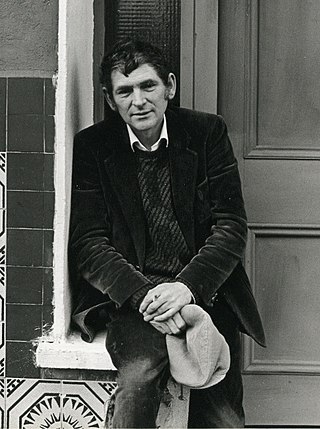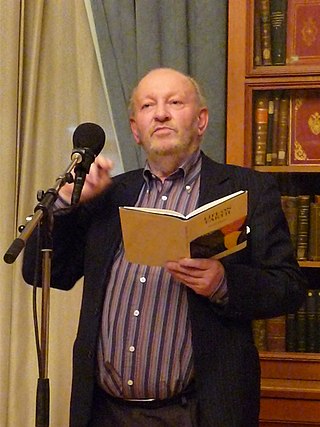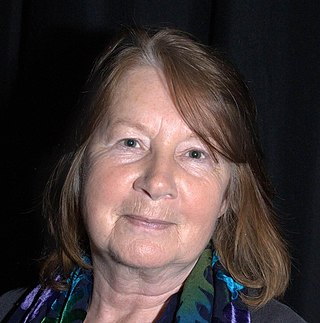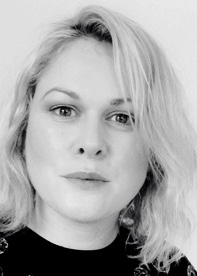Related Research Articles

Paul Muldoon is an Irish poet.
Eamon JR Grennan is an Irish poet born in Dublin, Ireland. He attended University College Dublin where he completed a BA 1963 and an MA 1964. He has lived in the United States, except for brief periods, since 1964. He was the Dexter M. Ferry Jr. Professor of English at Vassar College until his retirement in 2004.

Michael Hartnett was an Irish poet who wrote in both English and Irish. He was one of the most significant voices in late 20th-century Irish writing and has been called "Munster's de facto poet laureate".
Francis Arthur Ormsby is an author and poet from Northern Ireland.
Anthony Gerard Richard Cronin was an Irish poet, arts activist, biographer, commentator, critic, editor and barrister.

Michael Longley,, is an Irish poet.

Norman Derek Mahon was an Irish poet. He was born in Belfast, Northern Ireland but lived in a number of cities around the world. At his death it was noted that his, "influence in the Irish poetry community, literary world and society at large, and his legacy, is immense". President of Ireland Michael D Higgins said of Mahon; "he shared with his northern peers the capacity to link the classical and the contemporary but he brought also an edge that was unsparing of cruelty and wickedness."
Gerald Dawe was an Irish poet, academic and literary critic.
James Stewart Alexander Simmons (1933–2001) was a poet, literary critic and songwriter from Derry, Northern Ireland.

Medbh McGuckian is a poet from Northern Ireland.

John Harold Hewitt was perhaps the most significant Belfast poet to emerge before the 1960s generation of Northern Irish poets that included Seamus Heaney, Derek Mahon and Michael Longley. He was appointed the first writer-in-residence at Queen's University Belfast in 1976. His collections include The Day of the Corncrake (1969) and Out of My Time: Poems 1969 to 1974 (1974). He was also made a Freeman of the City of Belfast in 1983, and was awarded honorary doctorates by the University of Ulster and Queen's University Belfast.
Pearse Hutchinson was an Irish poet, broadcaster and translator.

John F. Deane is an Irish poet and novelist. He founded Poetry Ireland and The Poetry Ireland Review in 1979.

John Jordan was an Irish poet and short-story writer.
Constance Olive Leland Bardwell was an Irish poet, novelist, and playwright. She was part of the literary scene in London and later Dublin, where she was an editor of literary magazines Hibernia and Cyphers. She published five volumes of poetry, novels, plays and short stories, for which she received the Marten Toonder Award and the Dede Korkut Short Story Award from Turkish PEN. In later life, she moved to Sligo, where she co-founded the Scríobh Literary Festival. Her memoir A Restless Life details her difficult upbringing and her experiences in London and Dublin.
Alan Moore, is an Irish writer and poet, published by Anvil Press Poetry.
The Patrick Kavanagh Poetry Award is an Irish poetry award for a collection of poems by an author who has not previously been published in collected form. It is confined to poets born on the island of Ireland, or who have Irish nationality, or are long-term residents of Ireland. It is based on an open competition whose closing date is in July each year. The award was founded by the Patrick Kavanagh Society in 1971 to commemorate the poet.

Elaine Feeney is an Irish poet, novelist, and playwright. Her writing focuses on "the central themes of history, national identity, and state institutions, and she examines how these forces structure the everyday lives of Irish women". A former slam poetry winner, she has been described as "an experienced writer who has been wrestling with poetry on page and on stage since 2006" and in 2015 was heralded as "one of the most provocative poets to come out of Ireland in the last decade". Her work has been widely translated.
Edna Longley, is an Irish literary critic and cultural commentator specialising in modern Irish and British poetry.
Cecil Noel Sheridan was an Irish painter, performance artist, installation artist and actor. He was a member of Aosdána, an elite Irish association of artists.
References
- ↑ "Saint John of God Hospital" . Retrieved 1 April 2020.
- ↑ Tallant, Nicola (6 May 2007). "Kidnapped by his family and put in a mental home". Sunday Independent . Retrieved 22 June 2010.
- ↑ Stewart, Bruce. "Paul Durcan". Ricorso: A Knowledge of Irish Literature. Retrieved 22 June 2010.
- ↑ O'Reilly, Caitriona (26 January 2008). "A sharp and subtle voice". The Guardian . Retrieved 22 June 2010.
- ↑ Dwyer, Ciara (18 October 2009). "Laughter lines that come with a dark side". Sunday Independent. Retrieved 22 June 2010.
- ↑ Cullen, Paul (11 December 2009). "Durcan among four awarded degree". The Irish Times. Retrieved 2 October 2017.
- ↑ "SMC Sponsored Programs - Celtic Studies - Ireland Fund Artist-in-Residence Program". University of St. Michael's College. Retrieved 28 September 2017.
- ↑ "UCD honours Ireland Chairs of Poetry among Bloomsday conferrings and awards Ulysses Medal to Seamus Heaney". University College Dublin. 20 June 2011. Retrieved 2 October 2017.
- ↑ "Professor Paul Durcan". Ireland Chair of Poetry. Retrieved 2 October 2017.
- ↑ Goarzin, Anne (2010). "Paul Durcan's Unsettled Poetry". In Ross, Ciarán (ed.). Sub-Versions: Trans-National Readings of Modern Irish Literature. Amsterdam: Rodopi. pp. 161–177. ISBN 978-9-04202-828-9.
- Tóibín, Colm, ed. (1997). The Kilfenora Teaboy: A Study of Paul Durcan . Dublin: New Island Books. ISBN 1-874597-31-6.